This content originally appeared on Level Up Coding - Medium and was authored by Séverin Bruhat
Through my journey to software engineering management, I read various books. Here are my main takeaways.

When I knew I wanted to go down the engineering manager path, I decided to read a bunch of soft skills books: line management, project management, productivity, difficult conversations, company/team culture, etc.
If you are reading this article it’s probably because you are going through the same process. Finding the right book can be overwhelming as there are many resources out there. Some of these books are quite famous and you will hear everybody talking about them. Reading these sounds like the easiest move, but you may be adventurous and prefer to try something less popular. Hard to make a choice!
I made the decision to buy some of the famous (mainstream) ones after double-checking they were worth it by talking to a few managers I knew. In this article, I will cover 5 of these books and give you one takeaway I personally found useful per book.
Book #1: Resilient Management (by Lara Hogan)
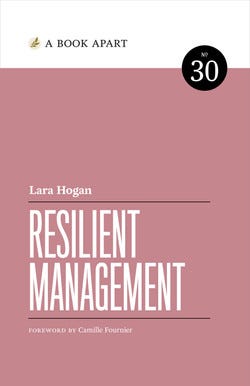
I saw Lara Hogan for the first time at the LeadDev London conference a few years ago and I loved her talk “Navigating team friction” so I decided to buy her book. As simple as that! This small book is one of my favourites.
My main takeaway: the feedback equation
In order to construct and deliver constructive feedback, Lara Hogan recommends following this equation:

You can find more information in her blog post but what I find really useful her is the “Observation” part, it forces you to take any feeling out of the equation, so you are purely factual. For me, when you deliver constructive feedback you do not want your emotions/feeling to drive you.
Book #2: The Coaching Habit (by Michael Bungay Stanier)
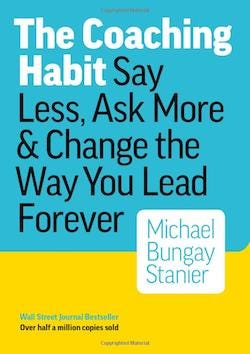
My previous manager recommended this book to me when I told him I wanted to become better at coaching (as I tend to default to mentoring). I really liked the format of this book and found it easy to read.
My main takeaway: Get Comfortable with Silence
This book describes an easy to follow 7 steps (questions) process in order to coach someone. The author calls them “The Seven Essential Questions”. You can easily find those questions online so I am not going to summarise them here. What particularly caught my attention in this book is Michael Bungay Stanier’s advice to “Get Comfortable with Silence”.
Indeed, when you coach someone (a colleague or a direct report) and ask those questions during a session, sometimes, there might be nothing but silence… That’s fine! Do not try to talk and make it easy for the person you are trying to coach, “bite your tongue and don’t fill the silence”.
Book #3: Accelerate (by Nicole Forsgren, Jez Humble, and Gene Kim)
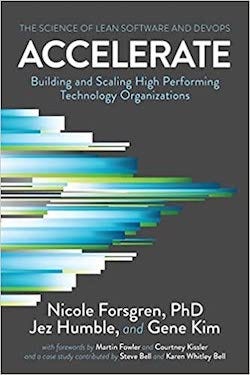
The Software Engineer inside of me has always been interested in this book, but never took the time to have a look at it. The excellent thing about Accelerate is that it’s based on science, studies, and research. Therefore you know that what you are learning is backed with real facts and data.
My main takeaway: Lean Management Practices
The authors modelled Lean Management and its application to software delivery with three components:
- Limit work in progress to make sure the team doesn’t get overburdened
- Visual Management (dashboard, key metrics, and indicators), available for engineers and managers
- Using data to make business decisions on a regular basis
Book #4: The Manager’s Path (by Camille Fournier)
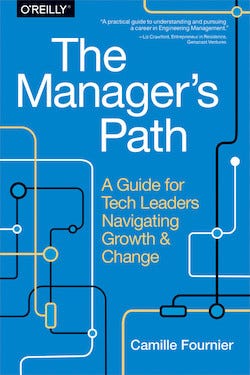
I think that one is a classic. Whether you are an experienced or a new manager, you might learn something from this book. Mentoring, leadership, tech lead, management (one or multiple teams, people, managers), Camille Fournier covers the whole range of management in this book.
My main takeaway: “YES, AND”
In order for a manager to do their job properly, sometimes they need to say no (to the team, the peers, the boss, the client, etc.). Being able to say no is not easy but it is an essential skill to learn. Personally, I think saying no is a good way to protect my (or my team members’) time.
But you can’t simply say “no”, right?
Let’s say your client or manager asks you to extend the scope or do a task that was not planned (and will impact your deadlines). Even if you are tempted to say “No, we don’t have time for this, this will mess up the deadline” (which the old me would clearly have done), try: “yes we can surely do that and all we will need to do is to delay the implementation of that feature or deprioritise that other piece of work”.
I find this tool “Yes, and” super powerful.
Book #5: Drive (by Daniel H. Pink)
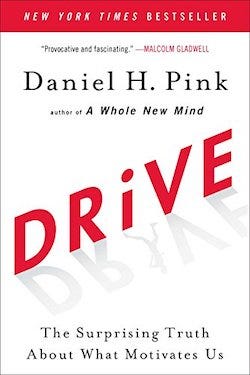
I know that book is controversial. Some people will tell you it is a must-read, and some will tell you it’s outdated and there are better resources. This book is all about how to motivate people, it takes a lot of the old-school methods and destroys their credibility based on scientific studies.
This book was quite an eye-opener: studies from the 50s prove that the “carrot and stick” model is not working (and often does harm), but it’s still a model used in lots of companies. I realised that being aware of the problem was not enough, we have to take action.
My main takeaway:
If you want to motivate people, you need to focus on those three elements:
- Autonomy: the desire to direct our own lives
- Mastery: the urge to get better and better at something that matters
- Purpose: the feeling of achieving something worthwhile (fulfilment)
Resources
This is my first Medium article and I enjoyed the experience of writing it. Thank you for reading it. I hope you’ve liked those (personal) key takeaways and that maybe you’ve learned something. If you have enjoyed this article, let me know and I could write another that covers 5 more books. Don’t hesitate to give this post a few claps if you liked it.
My Top 5 Takeaways From Management Books was originally published in Level Up Coding on Medium, where people are continuing the conversation by highlighting and responding to this story.
This content originally appeared on Level Up Coding - Medium and was authored by Séverin Bruhat
Séverin Bruhat | Sciencx (2023-03-10T14:42:27+00:00) My Top 5 Takeaways From Management Books. Retrieved from https://www.scien.cx/2023/03/10/my-top-5-takeaways-from-management-books/
Please log in to upload a file.
There are no updates yet.
Click the Upload button above to add an update.
